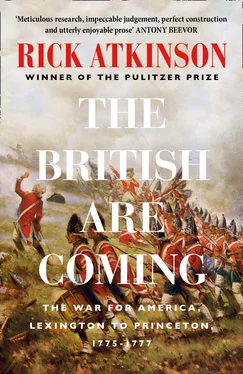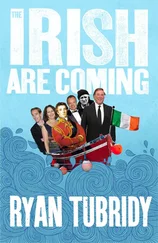Great responsibility would enlarge him. His youthful vainglory—“I heard bullets whistle and believe me there was something charming in the sound,” he had written his brother in 1754—had been supplanted by a more mature reflection that those charming bullets meant dead boys and sobbing mothers. War at its core, he acknowledged, was “gloom & horror.” Once keen to advance himself and his interests, whether as a land speculator or a young colonel on the make, he now displayed a becoming, if artful, modesty. He was seen as “noble and disinterested,” in John Adams’s phrase: ecumenical, judicious, formal but not regal, emblematic of republican virtues in sacrificing personal interest to the greater public good, yet elevated above the republican riffraff. As a passionate supporter of the American cause, a well-connected and native-born political figure, and a man “strongly bent to arms,” in his phrase, Washington was all but the inevitable choice to become commander in chief. Although he refrained from overtly angling for the post, he had worn his Virginia militia uniform in Congress to remind his fellow delegates of his combat experience. He had declined the offer of a $500 monthly salary, accepting only reimbursement for his expenses. From ferry fares and saddle repairs to grog and Madeira, those would be carefully logged in his account ledgers, beginning with the five horses and the light phaeton he bought before leaving Philadelphia.
Washington professed to be fighting for “all that is dear and valuable in life” against a British regime intent on “despotism to fix the shackles of slavery upon us”—a curious sentiment from someone who owned 135 slaves, including the intrepid Billy Lee, purchased for £61 and now at his side in Cambridge. Clearly he nursed resentments: at the preference given British land speculators, the imperial restrictions on western expansion, and the large debts accumulated with British merchants. Twice he had tried to ascend from the Virginia provincials by securing regular commissions for himself and his officers, and twice he had been snubbed. British tax policies jeopardized his commercial ambitions and offended his moral equilibrium; the royal governor in Virginia had threatened, through a technicality, to annul land grants issued twenty years earlier, which would have stripped Washington of twenty-three thousand wilderness acres.
Yet just as clearly he saw the glory of the American cause: a continental empire to be built upon republican ideals, buttressed with American mettle, ambition, and genius. He also knew that it could all end badly on a Tower Hill scaffold, as it had for the Jacobite rebels of 1745. Thousands had been arrested and at least eighty hanged or beheaded; some of their skulls were still displayed on spikes at Temple Bar in central London. As a precaution, Washington had drafted his will before leaving Philadelphia.
Few would guess that the imposing, confident figure who rode into Cambridge that Sunday afternoon concealed his own anxieties and insecurities. In tears he had told a fellow Virginian, Patrick Henry, “From the day I enter upon the command of the American armies, I date my fall, and the ruin of my reputation.” He also lamented leaving Martha alone in Virginia. “It has been a kind of destiny that has thrown me upon this service,” he wrote her. “I go fully trusting in the Providence, which has been more bountiful to me than I deserve.… I retain an unalterable affection for you, which neither time or distance can change.” To his brother he confided, “I am embarked on a wide ocean, boundless in its prospect & from whence, perhaps, no safe harbor is to be found.”
Washington would soon move his headquarters into the vacant Vassall House in Cambridge, a gray, three-story Georgian mansion that had been abandoned by its loyalist owner. The orchards, outbuildings, and sweeping vista of the Charles evoked his beloved Mount Vernon, although the house had been used by medicos after Bunker Hill and then as a bivouac by a Marblehead regiment; sanding grease and filth from the floors took more than a week. Washington chose a high-ceilinged, ground-floor room with Delft tile for his bedchamber, parked his new phaeton and saddle horses in the stable, and then set out to fulfill his marching orders from Congress: “take every method in your power, consistent with prudence, to destroy or make prisoners of all persons who are now, or who hereafter shall appear in arms against the good people of the United Colonies.” Greene, the young Rhode Island general, would later observe of Washington’s arrival, “It seemed as if the spirit of conquest breathed through the whole army.”
Washington needed little time to grasp the lay of the land. The former surveyor’s mahogany-and-brass spyglass showed two armies barely a mile apart, squinting “at one another like wildcats across a gutter,” in one officer’s description. The enemy was “strongly entrenched on Bunker’s Hill,” Washington wrote on July 10 to John Hancock, who as new president of the Continental Congress would be his primary correspondent in Philadelphia. Charlestown Neck had been ditched, palisaded, and fraised to thwart an American attack. White British tents covered the peninsula, and three floating batteries on the Mystic commanded the isthmus. In Roxbury, felled trees and earthen parapets blocked the Neck; many of the buildings that were still standing had been smashed or burned by incessant enemy cannonading. Washington’s own “troops of the United Provinces of North America,” as he grandly called them, occupied more than 230 buildings from Cambridge to Brookline, two dozen of which were used as hospitals. The enemy’s strength was reckoned at 11,500—almost twice the number Gage actually had fit for duty. “Between you and me,” Washington wrote a Virginia friend, “I think we are in an exceeding dangerous situation.”
Commands cascaded from his headquarters, the first of twelve thousand orders and letters to be issued in his name over the next eight years. Officers of the guard were to stop bantering with British sentries. All strongpoints must be defended; officers were to examine batteries to be sure that American guns were actually pointed toward the enemy. Pikes should be “greased twice a week,” and thirteen-foot lances would be made to complement the hundreds of shorter spears already ordered, though chestnut and other brittle wood ought to be avoided. Blacksmiths were authorized to work on Sundays. Because so few Yankees wore uniforms, rank would be color-coded: senior field-grade officers were to wear red or pink cockades in their hats; captains would wear yellow or buff; subalterns, green. A strip of red cloth pinned on the shoulder signified a sergeant; green indicated a corporal. Generals wore chest sashes: purple for major generals, pink for brigadiers, light blue for the commander in chief. Washington agreed to be called “your excellency,” despite private grumbling about the imperial implication. “New lords, new laws,” the troops told one another.
The Continental Congress had appointed thirteen lesser generals, mostly New Englanders, to serve under His Excellency. The only three who could be considered professional military veterans were former British officers—none had risen above the rank of lieutenant colonel—who had recently thrown in with the rebels. Washington quickly organized his army into three “grand divisions,” each commanded by a major general and composed of two brigades, typically with six regiments apiece. Ward led the division on the right wing, around Boston Neck. Putnam commanded the center, at Cambridge. The division on the left wing, overlooking Bunker Hill and ruined Charlestown, was led by Charles Lee, a brusque, vivid eccentric who had spent a quarter century in the king’s service before immigrating to America in 1773. Rather than the twenty-five thousand troops he had expected, Washington found—after excruciating efforts to get a reliable tally—that his host had less than fourteen thousand men actually present and fit for duty around Boston.
Читать дальше












